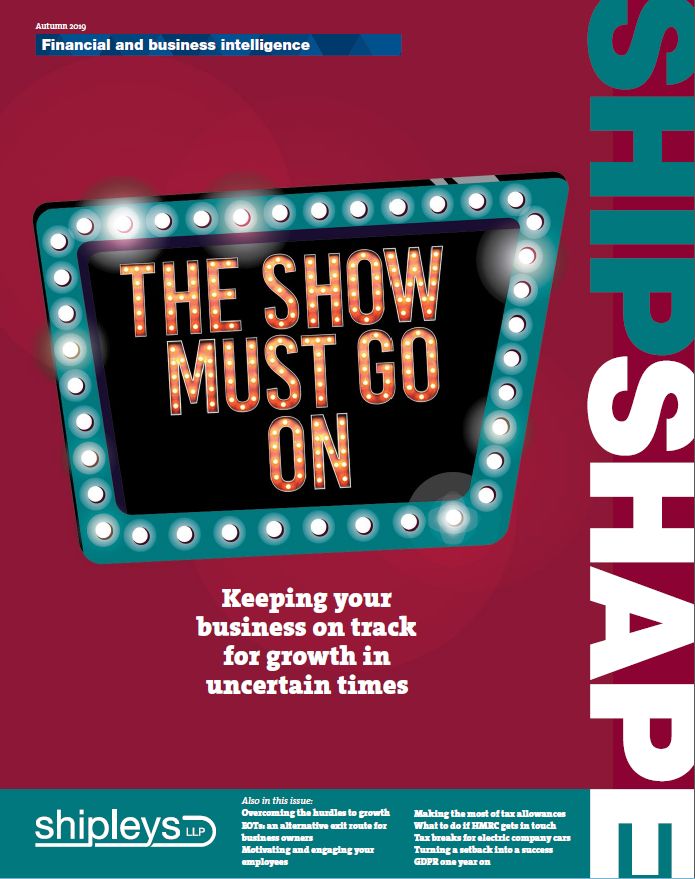
Simon Robinson’s Viewpoint
Don’t stop me now
More than three years of Brexit uncertainty have left many business owners itching to just get on with things.
Regardless of the path politics finally takes us down, a number of the businesses we work with are very focused on future growth.
So, it may seem counterintuitive, but is it time to take your business to the next level – whatever that may mean?
Knowing when is the right time to expand is never easy. Every business is different and faces its own unique challenges. Indeed, growth in itself is not always the be-all and end-all – sometimes a decision to keep calm and carry on can be the right strategy. But the most important thing is to have a plan.
Whatever path you choose for your business, at Shipleys we’ll do all we can to support you and help make those decisions. If you decide it’s time to move up a gear, here are some thoughts on things you might want to review.
Rocking all over the world
Growth for your business could mean looking to expand into new markets, both here in the UK or overseas. It’s a subject of seemingly never-ending debate, but a different relationship with the EU could bring the prospect of new global trade opportunities, especially with the present weakness of sterling making UK goods and services relatively inexpensive. Of course, weak pound also means more expensive supplies if you’re importing, putting pressure on profit margins.
Then there’s the potential additional red tape that exporters to the EU might face.
In the past two editions of Shipshape we’ve spotlighted how intra-EU movement of goods will need to be declared to HMRC in the event of no deal. In that case, an Economic Operator and Identification (EORI) number will help ensure your business pays the right amount of duty. Your business may also need to get Transitional Simplified Procedures (TSP) registration and an Authorised Economic Operator (AEO) certificate.
Career opportunities
Expansion could mean recruiting more staff. With unemployment apparently at its lowest rate in 45 years, that will certainly involve thinking hard about how to attract and retain the right people. At the same time, there are record low numbers of EU citizens joining the UK labour market. Staffing up to meet the demands of growth, or sudden market changes, has become a more profound challenge because of changing attitudes to work. Business owners now need to give much more thought to what the workplace environment needs to look like in five to ten years’ time to continue to motivate and engage staff, and to be more environmentally aware.
A recent Yougov report highlighted the impact that technology is having on transforming working arrangements and influencing what matters to people at work. The report found office location and flexible hours were the top influences on how people choose between employers, while they’re also swayed by perks like gym memberships and discount schemes.
Meanwhile, research commissioned to mark World Environment Day earlier this year found 73% of office workers want their workplace to improve its sustainability policy, and 24% claim they’d refuse a job at an organisation with a poor sustainability record.
The future is now
Then again, technology could be the very key to growth itself, whether it’s embracing cloudbased business solutions, robotic process automation or artificial intelligence (AI).
Digital technology has enormous potential to allow smaller, agile businesses with good ideas to take on established incumbents, providing them with low-cost, flexible and highly scalable IT solutions.
And the potential impact of AI is highlighted in a recent report from consultants McKinsey, which claims that AI could boost the UK economy by 22% in the next decade by making companies more productive.
Money (that’s what I want)
Of course, growth usually requires funding, whether that’s through investing more of the company’s profits in its future, maximising the tax reliefs available or finding external funding from traditional banks and investors, or the myriad of new sources such as crowdfunding. It’s claimed that more than £200m was invested in firms in 2017 via crowdfunding platforms like Crowdcube, Seedrs and SyndicateRoom. As with any type of funding, however, it’s important to be aware of the potential pitfalls as well as the benefits – something Shipleys’ experts are happy to help with.
Pass it on down
Business owners will also recognise that, ultimately, securing the company future may involve having a plan to hand over the reins of control to someone else at some point. It’s easy to put this off, but the long-term security of the company may depend on it.
One interesting and increasingly popular succession planning option is an Employee Ownership Trust (EOT) – a tax-efficient way to sell a business while maintaining its independence and giving control to staff. You can find out more about EOTs on page 4.
Elsewhere in this issue, we look at overcoming some of the hurdles to growth on page 2, at how businesses can learn from their mistakes on page 5, and at motivating and engaging employees as part of a growth plan on page 6 – along with a whole lot more.
Enjoy the read.



















